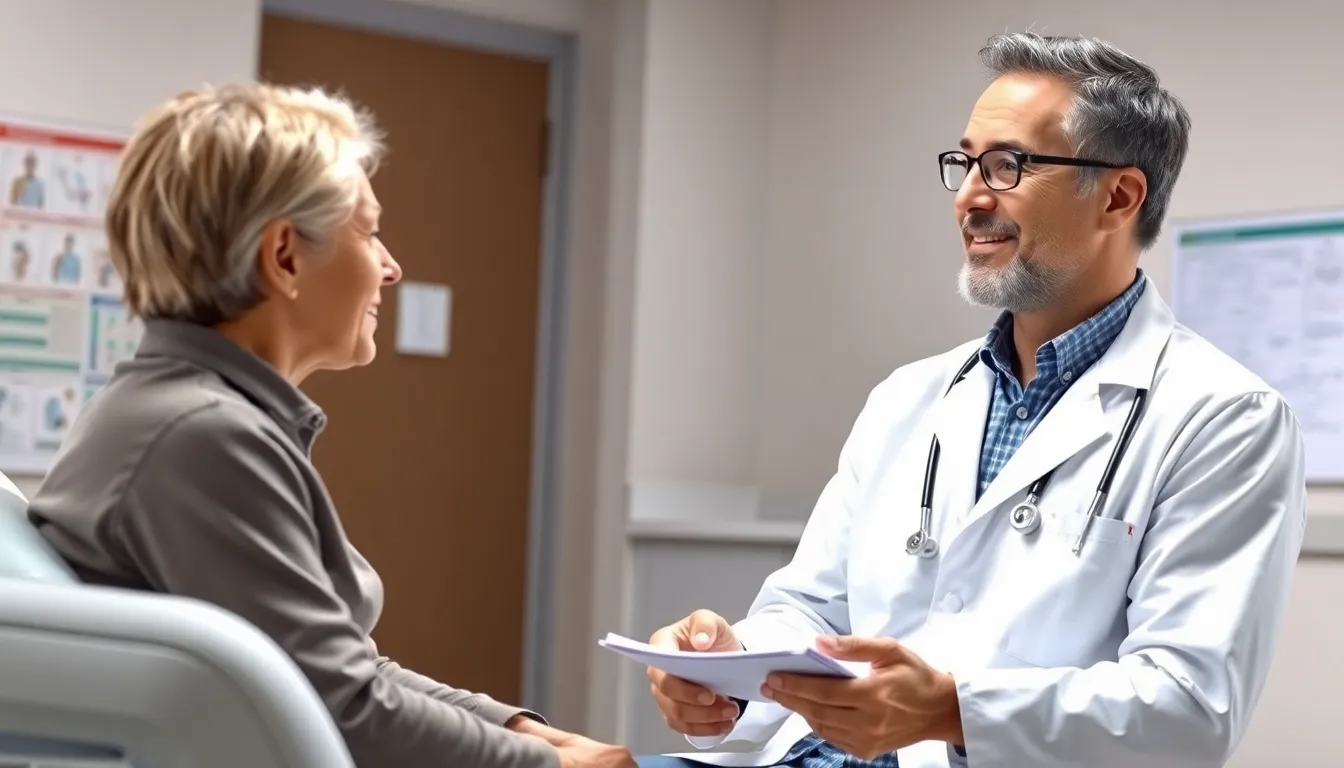Finding a gastroenterologist shouldn’t feel like searching for a needle in a haystack, especially when your stomach’s throwing a party it didn’t invite you to. Whether it’s bloating, heartburn, or that mysterious gurgling noise that could rival a horror movie soundtrack, knowing where to turn for help is crucial.
Luckily, the world of gastroenterologists is just a click away. With the right search, he or she can discover qualified specialists nearby who can tackle those tummy troubles with expertise and maybe even a few laughs. After all, when it comes to digestive health, it’s best to keep things light—pun intended! So buckle up and get ready to find the perfect gastro guru who’ll have you feeling like yourself again in no time.
Table of Contents
ToggleUnderstanding Gastroenterology
Gastroenterology focuses on the digestive system and its disorders. It encompasses various organs, including the esophagus, stomach, intestines, liver, and pancreas. Specialists in this field, known as gastroenterologists, diagnose and treat numerous conditions affecting the gastrointestinal tract.
Common issues treated by gastroenterologists include irritable bowel syndrome (IBS), inflammatory bowel disease (IBD), and gastroesophageal reflux disease (GERD). Symptoms like abdominal pain, diarrhea, and constipation often lead patients to seek their expertise. These specialists utilize various diagnostic tools, such as endoscopies and colonoscopies, to assess and treat conditions accurately.
Research indicates that nearly 35% of adults experience digestive problems at some point in their lives. Regular consultations can help in early detection of serious conditions, like colorectal cancer, which affects approximately 1 in 24 individuals in the United States. Preventive screenings provided by gastroenterologists significantly reduce mortality risk.
Patients benefit from discussing concerns with a gastroenterologist who understands the complexities of digestive health. It’s crucial to communicate symptoms clearly so that the doctor can offer tailored advice and appropriate treatment plans. Seeking specialist care ensures that any underlying issues receive the attention necessary for proper management.
Overall, understanding gastroenterology aids individuals in recognizing when to seek help. Digestive health is an essential aspect of overall well-being, and having a qualified gastroenterologist nearby facilitates better health outcomes.
Importance Of Finding A Gastroenterologist

Finding a gastroenterologist is crucial for maintaining digestive health. Early intervention can prevent serious complications and improve quality of life.
Signs You Need A Gastroenterologist
Experiencing persistent bloating signals the need for a consultation. In addition, frequent heartburn that’s not alleviated by over-the-counter medications warrants professional advice. Gastrointestinal symptoms like severe abdominal pain or prolonged diarrhea are also indicators for seeking specialized help. Changes in bowel habits, such as constipation or diarrhea, should prompt a discussion with a gastroenterologist. Lastly, unexplained weight loss is a significant reason to seek expertise.
Benefits Of Seeing A Specialist
Seeing a gastroenterologist enhances understanding of digestive disorders. Regular check-ups facilitate early detection of concerning issues, such as colorectal cancer. Personalized treatment plans address specific conditions effectively, leading to better management of symptoms. Consultation with a specialist allows access to advanced diagnostic tools, improving accuracy in identifying disorders. Additionally, open communication helps in tailoring dietary and health advice that fits individual needs.
How To Search For Gastroenterologist$s Near Me
Searching for gastroenterologists can be straightforward with the right approach. A few effective methods exist for finding qualified specialists nearby.
Online Directories And Reviews
Utilizing online directories simplifies locating gastroenterologists. Websites like Healthgrades, Zocdoc, and Vitals offer extensive lists of specialists, complete with patient reviews. Filtering results by location, conditions treated, and insurance accepted enhances the search. Read through ratings to gauge expertise and patient satisfaction. Look for gastroenterologists with a high volume of positive feedback, as this often indicates quality care. Consider also checking social media platforms and health forums. Engaging with local communities can yield valuable insights about trusted specialists in the area.
Recommendations From Your Primary Care Physician
Primary care physicians play a crucial role in referrals. They possess knowledge about local gastroenterologists and familiarity with patients’ health needs. Requesting recommendations allows for tailored suggestions based on specific symptoms or health concerns. Many primary care doctors maintain professional relationships with specialists, which can facilitate the referral process. When seeking a gastroenterologist, discuss symptoms thoroughly to ensure a proper recommendation. Further, having two or three suggested names can provide options for personal choice and comfort. This method emphasizes a collaborative approach to healthcare, enhancing overall patient experience.
What To Expect During Your Visit
Patients can expect a thorough evaluation of their digestive health when visiting a gastroenterologist. During this appointment, the specialist will assess specific symptoms and medical history to develop an effective treatment plan.
Common Procedures And Treatments
Several common procedures and treatments exist in gastroenterology. Colonoscopy assesses the colon for abnormalities and collects samples for further examination. Endoscopy allows visualization of the upper gastrointestinal tract, helping diagnose conditions like GERD. Gastroenterologists may also recommend imaging tests such as ultrasounds or CT scans to evaluate digestive organs. Medications often prescribed include antacids, proton pump inhibitors, and antibiotics, depending on the condition. For chronic issues, therapy options like dietary changes or referrals to dietitians may enhance management.
Preparing For Your Appointment
Preparation for the appointment can enhance the overall experience. Patients should jot down symptoms and medication lists before the visit. Keeping a food diary for a week might provide valuable insights into triggers. Bringing previous medical records can help the gastroenterologist understand the context of the patient’s condition. If undergoing procedures like colonoscopy, following specific dietary instructions and fasting guidelines is crucial. Arriving early allows time to complete paperwork and relax before the consultation, ensuring a focused discussion about health concerns.
Finding a gastroenterologist is a crucial step toward managing digestive health effectively. By utilizing online resources and seeking recommendations, individuals can connect with qualified specialists who understand their unique needs.
Open communication with a gastroenterologist not only aids in accurate diagnosis but also paves the way for tailored treatment plans. Recognizing the signs that indicate a need for expert help can lead to timely interventions and improved well-being.
Prioritizing digestive health is essential for overall quality of life, and reaching out to a specialist can make all the difference in navigating common concerns. Taking proactive steps today can lead to a healthier tomorrow.



